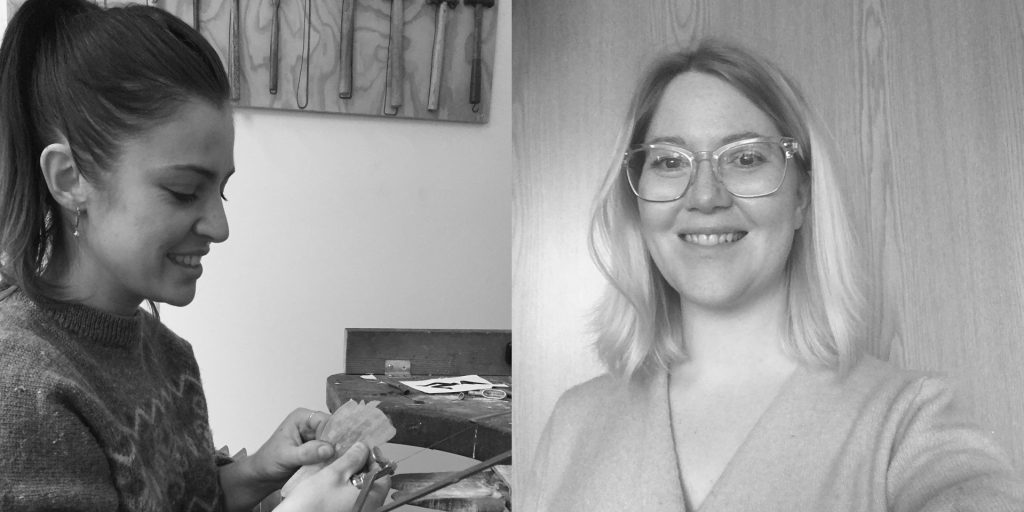Q+A: Rosemary James-Beith and Soizig Carey

Can you tell us about yourself and your experience within craft and education?
RJB: I’ve been working in the creative and cultural sector in Scotland for over a decade, managing contemporary arts projects like Footprints and ALBERT DRIVE at Tramway, running arts participation programmes, and carrying out evaluation and research for major events and festivals like Glasgow Mela, Turner Prize 2015, and Culture 2014.
My work in the last two years has been focused on providing research consultancy and project management to support creative organisations, like Puppet Animation Scotland, Scottish Contemporary Art Network and Glasgow Life to develop and deliver high quality cultural experiences.
In 2019 I embarked on a MSc in Creative Industries and Cultural Policy at the Centre for Cultural Policy Research, which led me to focus on policy research in Scotland’s craft sector, through a case study of the MAKE Manifesto. It was through this experience that I came to understand the importance of developing stronger formal craft education to support the sector and those who engage with it as makers, participants, audiences and consumers.
SC: I am a contemporary craft maker, specialising in jewellery. My practice is rooted in slow design and making, feminism and anti-capitalist consumer culture. I’m drawn to modernist design and pieces which are long-lasting, using materials and processes which are responsibly sourced and considered. Collaboration is a very important part of my practice, in particular with women artists whose aims are thought-provoking and playful.
Since graduating from Edinburgh College of Art in 2009, I have worked across crafts education and curatorial projects. I have taught from primary to university level and with organisations such as Cove Park, the National Museum of Scotland and Tramway. I joined O-PiN as co-director in 2014. O-PiN produces and delivers craft engagement with a playful focus on accessibility and material exploration.
I also work as Arts and Cultural Development Officer for Scottish Refugee Council, where I work with artists, activists and communities to support people who seek protection in Scotland.
What are you looking forward to in 2021 in your role as part of MAKE | Learn?
RJB: The Researcher role with MAKE | Learn allows me to really get into the detail of what’s happening in craft education in Scotland now. I’m looking forward to rich and insightful conversations with makers, teachers, educationalists and policy makers.
I’m also excited to be working with Craft Scotland and Panel who provide the project with a rigorous and critical framing, drawn from the MAKE Manifesto work to really understand and reflect the priorities and values of the sector they represent.
SC: This project presents an exciting opportunity for me to combine my cultural policy, equalities and project management experience with my craft and education practice. It has been an ambition following years of craft education and facilitation work to help influence future curriculum, so that craft becomes further embedded in schools and more accessible for young people from all backgrounds. Collaborating and working with makers is also one of my absolute favourite things.
What can we learn from a craft education?
RJB: I grew up encouraged to make things myself: grow my own food, sew and mend clothes, paint, draw, mould and build. These skills and experiences stay with you and deeply affect how you relate to the world around you. They give you confidence to shape your environment and see potential in everyday materials.
This project will explore what craft education can do for young people at a critical point in their lives; to develop skills for life, appreciation of the material world around them, and enjoyable creative and expressive experiences.
I know what craft has meant to me, and I am excited to learn from great work happening across Scotland, about what it means to young people and those working with them right now.
SC: Crafts are born as the result of the skills of people and the tools they have to hand, of innovation and exploration of materials. There is a slowness and humanity to craft which I fear is getting lost. We live in a capitalist economy, where people are more accustomed than ever to cheap and fast service and products across all sectors. This is extremely damaging to the craft sector and we risk craft skills and learning diminishing as a result. We risk generations not having much understanding or curiosity as to how things are made, and of their own creative potential.
Craft can teach us a lot about people and places. Many Scottish makers use materials which are locally sourced and specific to land and climate, materials which have been used and developed over generations. This can tell us so much about how communities lived and connected to surrounding environments. Craft is also a kind of visual language; a way to communicate non-verbally.
How can people get involved in your work?
RJB: I’m interested to connect with makers and teachers who are using craft in Primary and Secondary schools in Scotland. Over the next six months through this project I’ll be reaching out to gather examples of best practice, innovative ideas and bold approaches. If you’ve got a project or idea you’d like to discuss, I welcome you to get in touch by email:
The results of this research project will be made available through Craft Scotland and MAKE in Summer 2021.
SC: I’m interested in hearing from any teachers, educators or caregivers who would like to connect with the project. We want to make it as accessible as possible so it’s important I understand how it can work for you and the children in your community! Similarly, I’d love to hear from anyone working in/ around the circular economy.
Please get in touch with me at hello@soizigcarey.com
Contact the Project:
Are you a teacher or an educator? Would you like to find out more about MAKE | Learn? Please contact Rosemary or Soizig or get in touch with us at hello@makemanifesto.com if you’d like to get involved.
